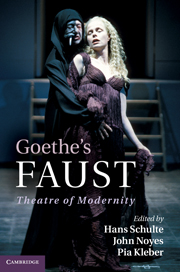Book contents
- Frontmatter
- Contents
- List of illustrations
- List of contributors
- Preface
- List of abbreviations
- Introduction
- PART I MODERNITY
- PART II THEATRE
- 13 Goethe's Faust: theatre, meta-theatre, tragedy
- 14 Faust beyond tragedy: hidden comedy, covert opera
- 15 Theatricality and experiment: identity in Faust
- 16 Rhetorical action: Faust between rhetoric, poetics and music
- 17 Directing Faust: an interview
- 18 A contradictory whole: Peter Stein stages Faust
- 19 Re-thinking and staging Goethe's Faust at the State Theatre Stuttgart 2005–6
- 20 Strehler's Faust in performance
- Select bibliography
- Index
- References
18 - A contradictory whole: Peter Stein stages Faust
Published online by Cambridge University Press: 01 June 2011
- Frontmatter
- Contents
- List of illustrations
- List of contributors
- Preface
- List of abbreviations
- Introduction
- PART I MODERNITY
- PART II THEATRE
- 13 Goethe's Faust: theatre, meta-theatre, tragedy
- 14 Faust beyond tragedy: hidden comedy, covert opera
- 15 Theatricality and experiment: identity in Faust
- 16 Rhetorical action: Faust between rhetoric, poetics and music
- 17 Directing Faust: an interview
- 18 A contradictory whole: Peter Stein stages Faust
- 19 Re-thinking and staging Goethe's Faust at the State Theatre Stuttgart 2005–6
- 20 Strehler's Faust in performance
- Select bibliography
- Index
- References
Summary
The moment when Faust is finally allowed to hold Helena in his arms (he is in fact paralysed by her, according to Mephisto, who watches with equal amusement and impatience), they are seated on a little, gold-covered sofa on a plinth under a canopy. ‘Now the soul does not look forwards nor backwards / The moment counts –’, says Faust, played by Bruno Ganz with a touch of inner salvation and inner emotion (9381–2). And Helena, played by Corinna Kirchhoff as equally moved by events and lost in the moment, adds, ‘it is our happiness’ (9382).
Faust believes he has held this feeling of time-melting, moment-filling happiness in his hands once before: in Part i of the tragedy, when the devil helped him to understand and gain the ‘model of all women’ (2601), which led him to indulge in ‘the sweet pain of love’ (2689). Margarete (Gretchen) is played by Dorothee Hartinger as the epitome of naturalness, which is only possible on stage, not in reality. On stage, the home for this happiness is represented by a simple wooden bed, covered with a white, creased bedcover which triggers in Faust a feeling of ‘awesome ecstasy’ (2709) and seduces him into the high-flown yet honest words ‘I wish that I had hours to spend here’ (2710). Gretchen's bed is placed in a highly visible position centre stage, surrounded by little houses in the background – it is a measured area of happiness, the poverty of which enables Faust to recognize ‘abundance’ (2693).
- Type
- Chapter
- Information
- Goethe's FaustTheatre of Modernity, pp. 280 - 292Publisher: Cambridge University PressPrint publication year: 2011
References
- 1
- Cited by



